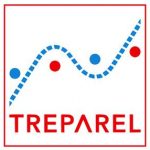Company MetaLayer Address 705 S. 3rd St. #3 Philadelphia, PA, 19147 USA Founders Jonathan Gosier & Matthew Griffiths Founded April 2011 Funding $ 30.000 Employees 3 Website www.MetaLayer.com Rating 7 bits MetaLayer is a big data startup that helps organisations make visualizations from large and complex datasets. Its objective is to make the worlds … [Read more...] about MetaLayer Offers Easy Big Data Visualization & Analysis Tools
Big Data
Learn everything you need to know about big data. Find out how companies are using this revolutionary technology and what it means for your business strategy.
Big Data Startup Treparel Is a Big Data Text Analytics Provider
Company Treparel Address Delftechpark 26, 2628XH Delft, The Netherlands Founders Dr. Anton Heijs Founded 2006 Funding 1 million Employees 10 Website www.Treparel.com Rating 6 bits Treparel is a big data text analytics and visualization software provider. They have developed the KMX platform (Knowing, Mapping and Exploration) that analyses and visualizes … [Read more...] about Big Data Startup Treparel Is a Big Data Text Analytics Provider
The Rise Of The Quantified-Self; And What It Means For Your Organisation
The quantified-self is a movement that has been around since the 1970s but only recently it took off due to the internet of things and the availability of monitoring devices that connect to smartphones. Todays smartphones carry a vast amount of all sorts of sensors that can track almost anything. The quantified-self is Big Data for consumers and consumers are collecting massive … [Read more...] about The Rise Of The Quantified-Self; And What It Means For Your Organisation
Emcien Corporation Uses Pattern-Discovery to Create Insights
Company Emcien Corporation Address 2859 Paces Ferry Rd #300 Atlanta, GA 30339, USA Founders Dr. Roy Marsten Founded 2002 Funding Unknown Employees 25 Website www.Emcien.com Rating 7 bits Emcien Corporation has developed several products to help organisations understand their raw datasets (structured and unstructured) and derive insights from it to improve … [Read more...] about Emcien Corporation Uses Pattern-Discovery to Create Insights
John Deere Is Revolutionizing Farming With Big Data
According to the United Nations Food and Agriculture Organization, food production must increase with 60% to be able to feed the growing population expected to hit 9 billion in 2050. John Deere uses big data to step into the future of farming to help farmers achieve this ambitious target. In 2012 they have released several products that can connect John Deeres equipment with … [Read more...] about John Deere Is Revolutionizing Farming With Big Data
What is big data?
Big data is a term that refers to the massive amount of digital data created and shared every day. Big data can transform how we live, work, and communicate. It can be used to improve everything from public health and urban planning to business and marketing.
Big data is also changing the way we think about privacy and security. The volume, velocity, and variety of big data present challenges and opportunities for organizations and individuals. Regardless, big data is here to stay, and its impact will only continue to grow in the years to come.
What is big data analytics?
Big data analytics is the process of turning large, complex data sets into actionable insights. Businesses use various analytical tools and techniques, including machine learning and statistical analysis, to do this.
Big data analytics can be used to improve decision-making in areas like marketing, operations, and customer service. It can also be used to identify new business opportunities and optimize existing processes. With the help of big data analysis, businesses can gain a competitive edge by using their data better.
Want to learn more about big data? Datafloq has courses available. Contact us to get started.
When was big data introduced?
The term big data was coined in the 1990s, with some giving credit to John Mashey for popularizing the term. However, the concept of big data has been around for much longer.
Where does big data come from?
In the early days of computing, scientists and businesses began to realize that the amount of data being generated was increasing exponentially. As a result, they began to develop new methods for storing and processing data.
Over time, these methods have become increasingly sophisticated and have played a key role in enabling businesses to make sense of vast amounts of information. Today, big data is used in various industries, from retail to healthcare, and its importance is only likely to grow in the years to come.
What are examples of big data?
One of the most common examples of big data is social media data. With over 2 billion active users, Facebook generates a huge amount of data every day. This includes information on user interactions, posts, and even location data. Analyzing this data can help companies better understand their customers and target their marketing efforts.
Another example of big data is GPS signals. These signals are constantly being generated by devices like cell phones and fitness trackers. When combined with other data sets, GPS signals can be used to provide insights into everything from traffic patterns to human behavior. Finally, weather patterns are another type of big data set. By tracking these patterns over time, scientists can better understand the impact of climate change and develop strategies for mitigating its effects.
How do companies use big data?
Companies use big data in marketing, product development, and customer service. By analyzing large data sets, businesses can identify patterns and trends that would be otherwise difficult to spot. For example, a company might use big data to track customer behavior patterns to improve its marketing efforts.
Alternatively, a company might use big data to improve its products by identifying areas where customers are most likely to experience problems. For instance, big data can be used to improve customer service by finding pain points in the customer journey. Ultimately, big data provides companies with a valuable tool for gaining insights into their business operations.







